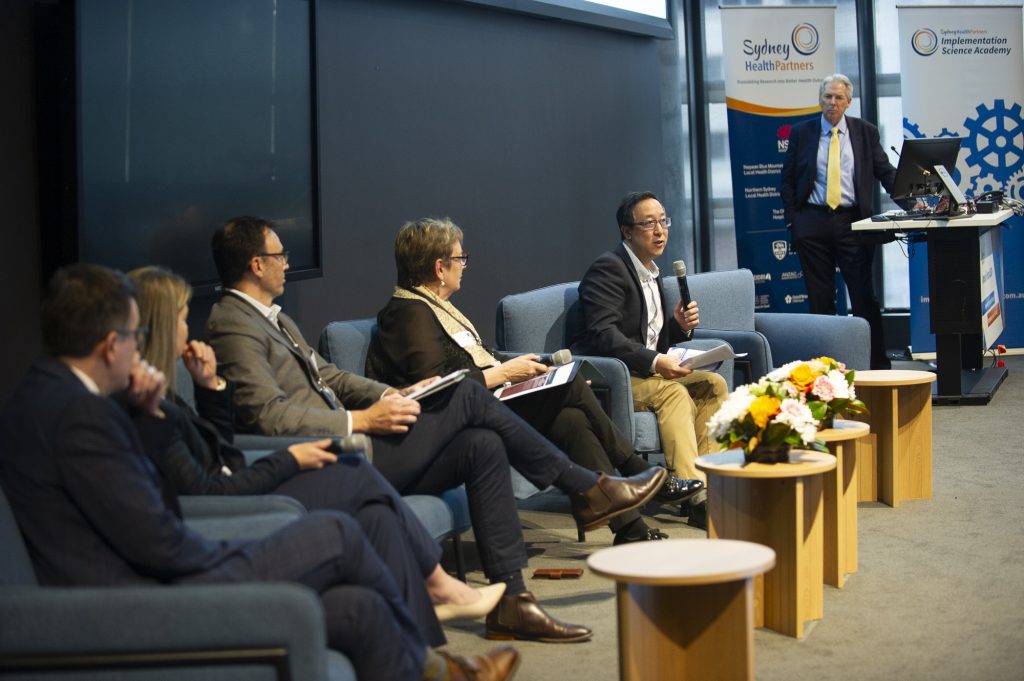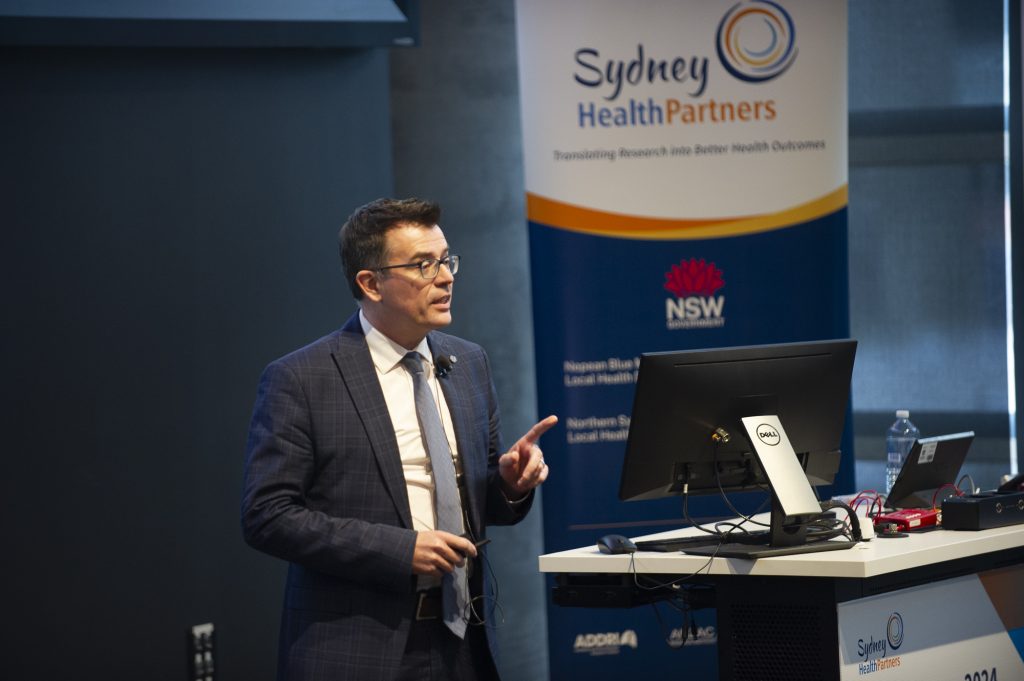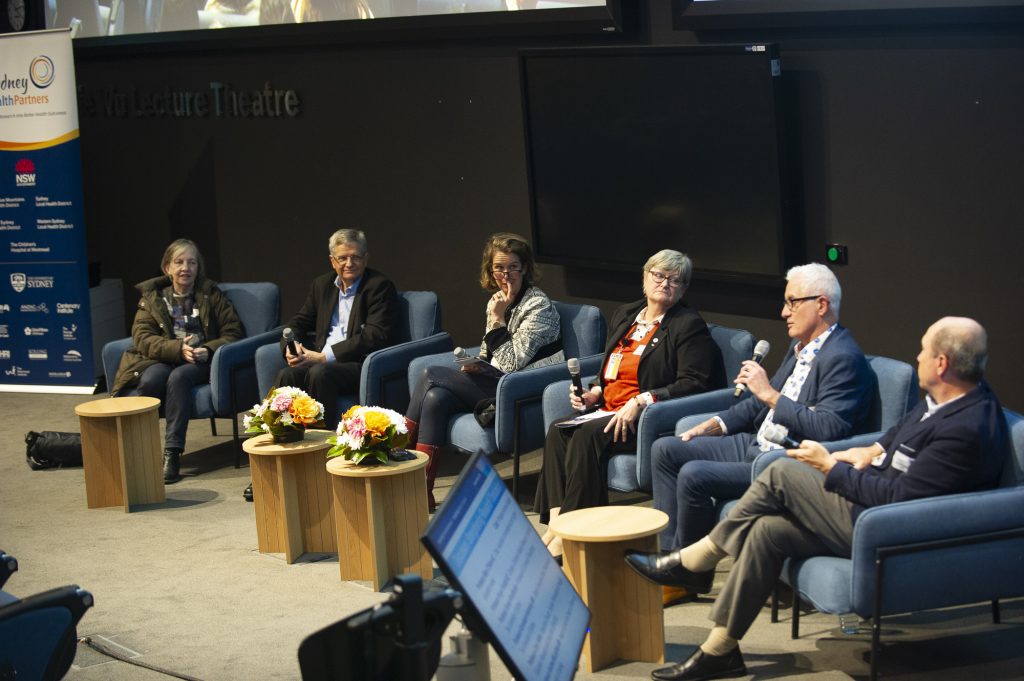Maximising translational research and workforce retention in healthcare
Streamlining processes to translate research findings into routine clinical practice and fostering the next generation of clinician-researchers were hot topics at the Sydney Health Partners Annual Forum. The Office for Health and Medical Research had a strong presence at the Forum, where Adjunct Professor Jean-Frédéric Levesque, Deputy Secretary, Clinical Innovation and Research and Chief Executive, Agency for Clinical Innovation gave the opening address and translational research and workforce retention were major themes.

From the development of the ultrasound machine and cochlear implant to vaccines for cervical and skin cancer, Australia has been at the forefront of many breakthroughs in medical treatments, devices and diagnostic tools. But as these continue to evolve at a galloping pace, how do we more rapidly and frequently translate research into new treatments for patients? What workforce do we need to be future-ready for the innovations coming down the pipeline and how do we retain our globally respected healthcare clinician- researchers by providing more scaffolding for sustainable careers?
These critical considerations were discussed at the recent 5th Sydney Health Partners’ (SHP) Annual Forum. Medical and health system leaders and researchers gathered at the University of Sydney for an afternoon of informative presentations and robust panel discussions chaired by SHP Executive Director, Professor Don Nutbeam AO. Sydney Health Partners aims to advance alliances to accelerate research innovations into healthcare improvements. It fosters collaboration between five NSW Local Health Districts (LHDs), The University of Sydney and 10 affiliated medical research institutes, including The Westmead Institute for Medical Research and Melanoma Institute Australia. SHP aims to foster greater collaboration and support sector partners to compete effectively for research resources and talent. The main theme of this year’s SHP annual forum was, ‘Supporting translational research and strengthening research translation’.
Building capacity and capability
The opening address was presented by keynote speaker, Adjunct Professor Jean Frédéric Levesque, NSW Health’s Deputy Secretary, Clinical Innovation and Research and Chief Executive, Agency for Clinical Innovation. In providing an overview of how NSW Health is fostering a vibrant healthcare ecosystem with faster translation from bench to bed, Levesque spoke of research and innovation and the importance of future readiness via bio preparedness, supply-chain and domestic manufacturing. He discussed the establishment of the Clinical Innovation and Research Division within the Ministry of Health and reported on some of the achievements of the Office for Health and Medical Research (OHMR). These included developments in infrastructure, including the Viral Vector Manufacturing Facility and Rural Regional and Remote Clinical Trial Program. Government and policy initiatives, such as Future Health performance metrics and GMP Future Workforce Roundtable. The impacts of grants, such as OHMR’s Medical Devices Fund and Early Mid-Career grants for researchers were highlighted. Forward-facing initiatives such as the Artificial Intelligence Taskforce were also mentioned.
Adjunct Professor Levesque raised the importance of strategies for adopting genomics, proteomics (the large-scale study of proteins) and metabolics (the large-scale study of metabolites in cells, tissues, organisms and biofluids). Adopting these technologies enables more cutting-edge healthcare options to be researched and translated into treatments to improve patient outcomes “To embrace these rapid advances we are utilising emerging technological advances for data research and system management and addressing functional and operational challenges of personalised and precision medicine,” he explained. “We are also harnessing new business models in manufacturing and commercialisation to embrace innovations such as CAR-T (which uses the patient’s own protective T cells), gene therapies, cancer typing, novel therapeutics, 3D printing and venture philanthropy.”

Fostering the next generation of clinicians and researchers
Fostering a future-ready workforce capable of supporting rapid innovation and research translation, was a pivotal theme of the forum. So, workforce retention was high on the agenda during the presentations and panel discussion that followed. “We need conversations between universities, government and LHDs to help establish where the gaps are, while exploring how we build sponsorship and assist pilots to progress in a more rigorous way,” said Levesque. “We also need to address workforce shortages and changes in required skillsets related to GMP manufacturing, data literacy, personalisation and precision medicine.”
Dr Alan Ma, SHP Research Translation Fellow and Clinical Geneticist at Sydney Children’s Hospitals Network, highlighted the need for greater support for clinician-researchers in their career pathways to avoid attrition when they finish their research degrees and PhDs. “Early career clinician researchers are the clinical research workforce of the future, so we need to have opportunities for them to continue utilising their skills,” said Dr Ma. They also need a viable clinician-researcher career pathway, which doesn’t really exist currently.”
The importance of providing a skilled workforce, with clinician researcher pathways and targeted research and innovation funding was also emphasised by Professor Louise Baur AM, President of the Australian Academy of Health and Medical Sciences. In addition, Baur advocated for greater consumer and community involvement that includes the voices of families, adolescents and children and allows for more integrated teams and cross-sector collaboration. Other panel contributors included Adjunct Associate Professor Paula Bray, Director of Research, Sydney Children’s Hospitals Network and experts in the areas of patient infrastructure, digital patient records and geriatric pharmacology in medicine.

Addressing skills and training
Though research and innovation is supported by world class health and education sectors in NSW, “to meet the skills needs in healthcare requires significant system growth, more people entering higher education and more integration between vocational education and higher education,” said
second keynote speaker Professor Mary O’Kane AC, Chair of the Australian Universities Accord higher education review, (and Chair of the Board of Sydney Health Partners). Professor O’Kane observed that skills need to be at a higher level than ‘just can do’. This reboot requires greater facilitation of lifelong learning with more opportunities to retrain. “Our workforce needs portable and stackable skills, such as micro credentials,” said O’Kane. “We need ‘earn while you learn’ options including more paid practicum placements and fee-free options for study and bridging qualifications. Increased sector responsiveness is important to ramp up delivery of new and urgent skills, for example, through TAFE Centres of Excellence and also greater recognition of prior learning. It would also be very beneficial to establish a national skills passport and progress the review of the Australian Qualifications Framework.”
Experts in the areas of health, education, research and enterprise, pharmacy, implementation science and pediatric medicine also contributed to the Session 2 panel discussion. The forum then concluded with a celebration of the achievements of emerging clinician-researchers with the presentation of their Annual Early Career Research Awards which target early-career researchers and clinician-researchers, (up to ten years post PhD).
Updated 5 months ago